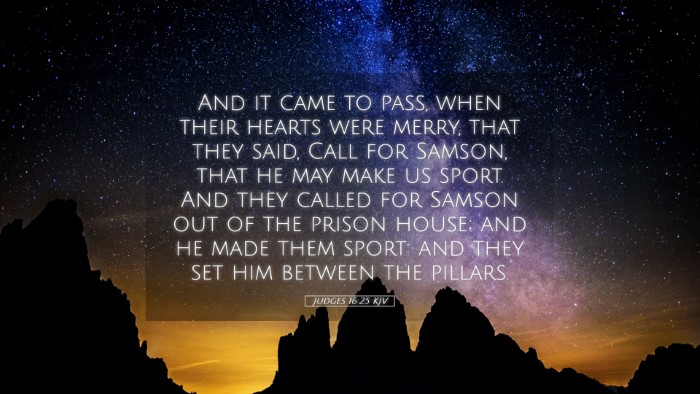Commentary on Judges 16:25
Introduction
Judges 16:25 provides a poignant and significant moment in the narrative of Samson, encapsulating themes of power, betrayal, and divine sovereignty. In this verse, we witness a turning point where the Philistines exploit Samson's vulnerability, showcasing both the consequences of his actions and the overarching sovereignty of God.
Text of Judges 16:25
“And it came to pass, when their hearts were merry, that they said, Call for Samson, that he may make us sport. And they called for Samson out of the prison house; and he made them sport: and they set him between the pillars.”
Historical Context
The historical framework of Judges highlights a period in Israel's history marked by moral decline and cyclical apostasy. Samson, a Nazirite, was chosen by God to deliver Israel from the hand of the Philistines. However, his story is marred by personal failures, particularly in the realm of relationships, which ultimately led to his capture and demise.
Verse Analysis
Philistine Celebration
“When their hearts were merry”
As noted by Matthew Henry, this phrase illustrates the Philistines' revelry and sense of triumph. Their merriment derives from both their victory over Samson and the collective relief from his threats to their dominance.
Call for Samson
“Call for Samson, that he may make us sport”
This request indicates a deeply ingrained sense of humiliation for Samson. The Philistines sought entertainment at the expense of the once-mighty judge. Adam Clarke emphasizes how this moment exemplifies the lowly state to which Samson has fallen—once a revered leader now reduced to a mere source of amusement.
The Setting Between the Pillars
“They set him between the pillars”
Symbolically, the pillars can be seen as representing the strength of the building (the Temple of Dagon) and, conversely, the weakness of Samson's situation. The juxtaposition of strength and vulnerability resonates with Albert Barnes's assertion that this scene underscores a profound contrast: Samson's physical might versus his spiritual and moral failures.
Theological Implications
The events of Judges 16:25 raise several theological considerations:
- The Nature of Sin: Samson's sin, particularly in relation to Delilah, led to his downfall, illustrating the destructive power of yielding to temptation.
- God's Sovereignty: Despite Samson’s failures, God’s plan for Israel continued to unfold. This moment serves to remind believers of God's control over circumstances even when human agents err.
- Redemption through Humiliation: The deterioration of Samson's status presents the paradox of redemption; his eventual cry for strength exhibits a return to reliance upon God, which will culminate in his ultimate act of deliverance.
Moral Lessons
Judges 16:25 speaks to the moral and ethical lessons valuable for pastors and theologians:
- Accountability: Leaders should recognize their vulnerabilities and the effects of their actions, understanding that personal moral failure can lead to corporate consequences.
- The Cost of Complacency: Samson's descent reveals the perils of complacency in spiritual matters, serving as a warning against losing sight of one's commitments to God.
- Restoration is Possible: Even in moments of great despair, there lies potential for restoration and purpose, demonstrated through Samson's final prayer and actions.
Conclusion
Judges 16:25 is a microcosm of Samson’s journey—a narrative intertwining strength and weakness, victory and defeat. As church leaders and students of Scripture reflect on this verse, let them be reminded of its weighty implications for faithfulness, the nature of sin, and the profound grace of God that operates through and despite human frailty. Ultimately, while Samson's story is one tinged with failure, it also reverberates with the promise of redemption, echoing God's unwavering faithfulness to His people.


